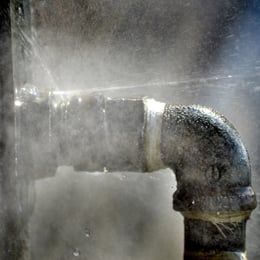 Think about how many hours you are away from your home. Whether it is going to work everyday, a weekend getaway, or a family vacation, many of us are gone for an extended period of time. Now, imagine how you would feel if you came home after a nice relaxing vacation, or a weekend getaway to find water in your finished basement, your living room ceiling collapsed, or water running down your stairs. Unfortunately, I have come home to a broken water main spraying thousands of gallons of water in my finished basement.
Think about how many hours you are away from your home. Whether it is going to work everyday, a weekend getaway, or a family vacation, many of us are gone for an extended period of time. Now, imagine how you would feel if you came home after a nice relaxing vacation, or a weekend getaway to find water in your finished basement, your living room ceiling collapsed, or water running down your stairs. Unfortunately, I have come home to a broken water main spraying thousands of gallons of water in my finished basement.
Water damage is the second-most frequently filed homeowner insurance claim. Unfortunately, there is a common misconception that water damage in your home is no big deal; however, this is the farthest thing from the truth. Statistics have shown that we are seven times more likely to experience water damage rather than fire damage and six times more likely to experience water damage than a burglary.
This is a list of the common causes of plumbing leaks that lead to water damage in our homes.
• Dishwashers
• Ice makers
• Water heaters
• Toilets
• Sinks
• Washing machines
• Showers and tubs
Whether you experience a catastrophic water leak or a small unnoticed water leak, the damage can be devastating. Here is a list of things you can do to protect your home from water damage.
1. Check hoses and faucets on a regular basis. Experts recommend checking hoses that lead to your washing machine, dishwasher, and refrigerator on an annual basis, looking for cracks or water leaks. They also recommend replacing all hoses every five to seven years.
2. Check showers and tubs. Make sure the caulking around your shower(s) and tub(s) are watertight. If you see cracks in the caulk, replace it. Caulk is very inexpensive and can prevent water from seeping into your floor.
3. Know where and how to shut off your water main. If a pipe suddenly bursts in your home, it is important to know how to shut off the water supply. In most situations, shutting off the water main will stop the flow of water. To order free water main shut-off tags, click here.
4. Install floor pans. Consider installing floor pans under your appliances. While they can’t protect you from a catastrophic leak, they can prevent damage from small slow undetected leaks.
5. Consider purchasing point of leak water alarms. Water alarms work like smoke alarms. When water is detected in a specific area, an alarm is triggered, warning you of a water threat. These sensors can be placed in basements, laundry rooms, bathrooms, kitchens, or next to the sump pump.
6. Consider purchasing a water flow monitoring system. A water flow monitoring system is attached to your water main and protects your entire house. The system works by measuring water flow into your house. If it detects continuous water flow beyond the normal stopping and starting of your everyday appliances, it stops the flow of water into your house automatically. To learn more about how this advanced system works, click here.
Do you have any tips or related information you’d like to share? I’d love to hear from you; please share them in the box below.
Sources:





